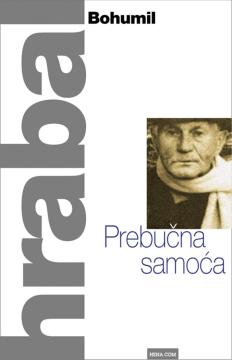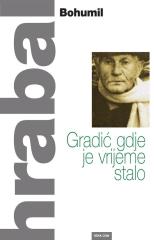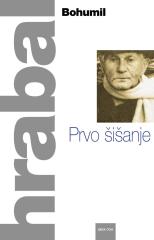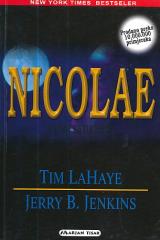
Prebučna samoća
Prebučna samoća (1976.), roman Bohumila Hrabala, introspektivni je monolog Hant'e, starog radnika u sabiralištu papira u Pragu, koji 35 godina pritiska stari papir i knjige hidrauličnom prešom u pakete, nazivajući to svojom "love story".
Stari Hant'a, pripovjedač i glavni lik, već 35 godina radi na preši u sabiraonici staroga papira. Zaslugom profesije, on je protiv svoje volje obrazovan jer iz gomila staroga papira spašava vrijedne knjige osuđene na likvidaciju. U svom stanu gomila knjige koje sadrže duboke misli filozofa i pjesnika, strasno se predavajući njihovu čitanju. Vjeruje da će mu one pomoći da sazna nešto temeljno o sebi.
Radeći na preši, prisjeća se svoje mladosti, tragikomične ljubavi prema djevojci Mančinki, idiličnog suživota s mlađahnom Cigankom tijekom rata, majčine i ujakove smrti. Nadolaze mu ideje najdražih filozofa (Schopenhauer, Hegel, Nietzsche, Roterdamski), meditira nad njima i konfrontira ih s vlastitim doživljajima. U ekstatičnom ga ukazanju u njegovu podrumu posjećuju Lao-tse i Isus Krist, a za noćnoga rada razgovara s "mladim" Kantom.
U podrumskim pogonima susreće visokoobrazovane ljude, u kanalima grada prati rat štakorskih klanova i opisuje ozračje Praga 70-ih godina. Jednoga dana vidi golemu modernu prešu i s užasom utvrdi da guta i prerađuje knjige a da niti jedna jedina stranica nije uprljala ljudske oči i ljudski mozak i srce. Uskoro ga u podrumu sabiraonice zamjenjuju dva mladića koji priznaju sasvim drugačiji način rada doduše efikasan, ali potpuno mehanički i neosoban. Premješten je na posao s čistim papirom pri kojemu više ne može otkrivati mudre knjige. Sa svojim "izgnanstvom iz raja" ne uspijeva se pomiriti. U bizarnom snu gigantska preša postupno preša cijeli Prag...
Lirsko-meditativni tekst Prebučna samoća nastavlja se na sizifovski motiv filozofije A. Schopenhauera, osobito na njegovu aktualizaciju u djelu Mit o Sizifu A. Camusa. Svoje praizvore, međutim, nalazi u tradiciji taoističkog mišljenja koje osamljenoj ljudskoj jedinki nudi put do samospoznaje, istodobno i oslonac nasuprot užurbanom i otuđenom svijetu.
Angeboten wird ein Exemplar





